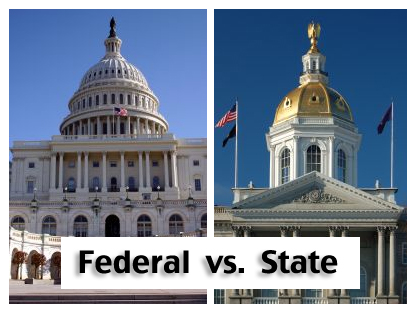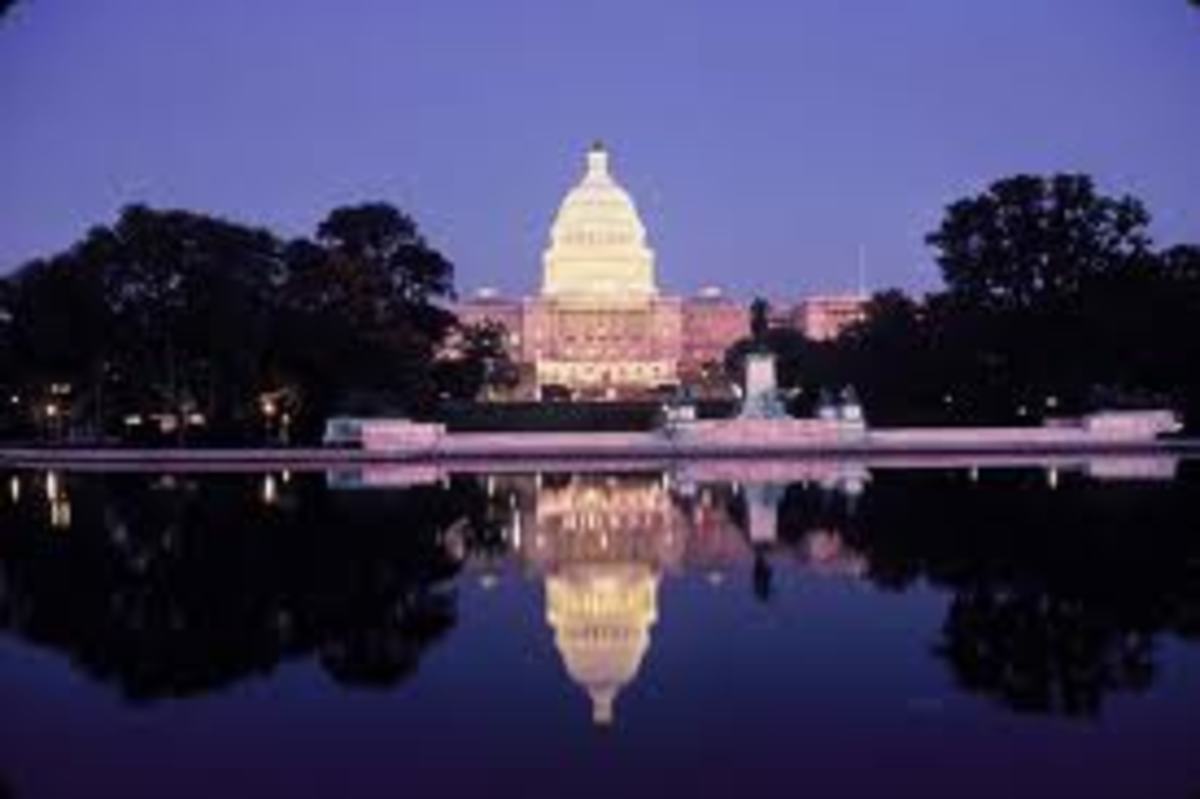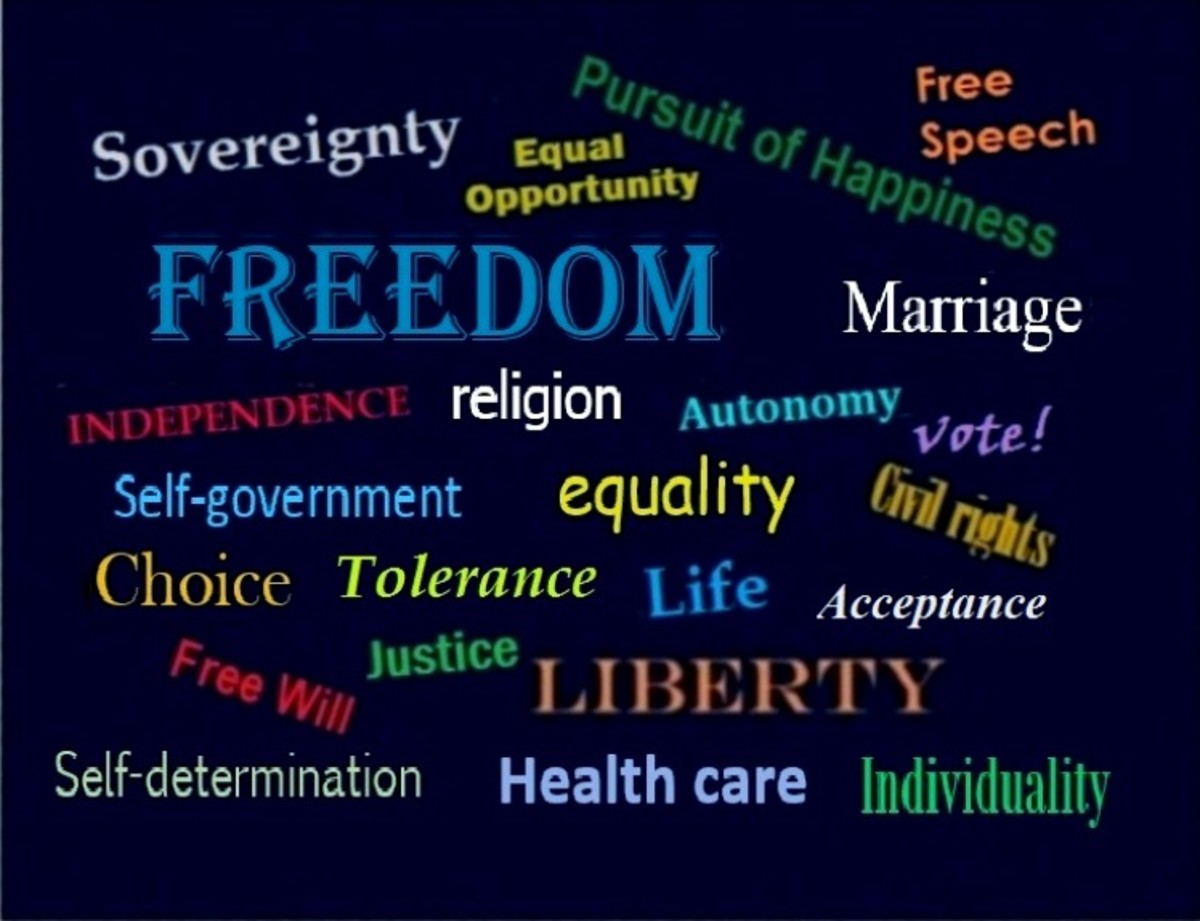“What should the federal government do?” - A Historical Overview
“What should the federal government do?”
(Professor Jones is giving a lecture on the role of the federal government. His students are sitting around a big table and are eager to ask him questions.)
Jones – opening remarks: When the United States began under the Constitution in 1789, the nation was very small. The population was about four million. The federal government had only a few agencies and departments. Over time, the government became large and powerful. Today, we’ll discuss the evolution of the U.S. federal government.
Student 1: If my memory serves me correctly, Secretary of the Treasury, Alexander Hamilton, wanted a strong central government, while Secretary of State, Thomas Jefferson wanted a weaker central government. They couldn’t stand each other. Correct?
Jones: Yes. Hamilton’s first job was to take care of the nation’s finances. His plan was to assume the debt of all 13 former British North American colonies in order to bind all member states in the Union together. To do this, he created the Bank of the United States. The Constitution does not say clearly whether the federal government could create such an institution or not. Hamilton appealed to the “necessary and proper” clause of Article One, Section 8 and got the bank going.
Student 2: Yeah, but that’s not the only story. Jefferson and Madison got the nation’s capital in the South in exchange for this bank. I remember Jefferson opposing Hamilton at every turn when the United States was just starting.
Jones: Jefferson was a classic liberal of his day, a true disciple of John Locke, so to speak. He was suspicious of government authority and insisted that liberty was most important above all. His ideal was to have a limited government in which the government derived its just authority from the consent of the governed. He couldn’t agree with Hamilton’s insistence on having a strong executive branch of a powerful central government. For Jefferson, the state government was closer to the people and was easily controlled. This new federal government was an unknown entity back then.
Student 3: Does this mean that Hamilton didn’t believe in liberty?
Jones: No, it doesn’t mean that. Hamilton believed in liberty, but certainly not to the extent that Jefferson did. First and foremost, Hamilton didn’t trust the masses. For the sake of law and order, he advocated for a strong British-style central authority. His economic policies reflected his favoring of a wealthy class of bankers and merchants. For him, the progress of the United States depended on a robust economy centered on manufacturing and trade. Catering to the passions of masses was not Hamilton’s thing.
Student 3: No wonder Jefferson couldn’t stand Hamilton. Jefferson was a farmer at heart, and he insisted that the farmers were God’s chosen. Unlike those business people in big cities, farmers worked the land and earned an honest living. Jefferson’s idea was to create a nation of independent farmers who enjoy abundant liberty. If I am not mistaken, the farmers back then represented the majority of the U.S. population.
Jones: You are right about that. The Jefferson-Hamilton rivalry stems from the differences in their respective vision for the future of this nation. And guess what? This difference will be played out again between Andrew Jackson and Henry Clay.
Student 4: I heard about their mutual hatred since the election of 1824. Henry Clay and John Quincy Adams made the infamous Corrupt Bargain to defeat Jackson even though Jackson received the most popular votes.
Jones: You remember the Corrupt Bargain! That’s impressive. But, that old wound wasn’t the only thing that divided Clay and Jackson. Their mutual hatred had to do with the differences in their respective vision for the future of the United States. Clay advocated for the American System to make the United States wealthier and more business friendly. For me, Clay is Hamilton 2.0.
Student 4: Would you explain what this American System is?
Jones: Sure. The American System was a federal government initiative to foster national growth through protective tariffs, internal improvements, and the Bank of the United States. Clay was unswerving in his support for internal improvements, which meant federally funded roads and canals. Jackson believed the American System to be unconstitutional. He questioned: could federal funds be used to build roads? Jackson famously vetoed the Maysville Road Bill; thereby, in essence, refusing to expand the role of the federal government.
Student 4: I see. I remember Jackson killing the Second Bank of the United States, the charter of which Clay was trying to have it renewed. So, does this mean the Jeffersonian view won over the Hamiltonian vision in the 1830s?
Jones: Yes, at the time. Jackson was a man of the people. Today, he would be seen as an antiestablishment populist. Many voters echoed Jackson’s distrust of the northeastern moneyed interests. But, things changed over time. The Civil War took place, and the North won. The argument for states’ rights took a back seat. The federal government was massively involved in the Reconstruction of the defeated South. The passages of the 13, 14, and 15th amendments to the Constitution took place, and the federal government’s direct attempts to remake the South in the North’s image went on for several years. But then, the people got tired, and the Reconstruction of the South was not completed. There was a kind of respite from the ever-expanding power of the federal government in the late 1800s.
Student 5: That’s unfortunate. Newly freed slaves had to endure another century of hardship. Why didn’t the federal government make sure that the United States would truly live out the creed that all men are created equal?
Jones: I hear your frustration, but we're talking about the people of the 19th century. Racial equality was still not realistic, given how most white folks felt about the black people. Besides, the government in general went into a kind of hibernation with the onset of the Gilded Age. The 14th amendment was meant to guarantee the civil rights of black people against the state laws in the South. But, the amendment was invoked to guarantee the rights of large corporations against the state laws that tried to regulate business practices. The Gilded Age in general was not an energetic time, politically speaking. Most people can’t name a single president who served between Grant and Teddy Roosevelt.
Student 6: Yeah. It’s fitting that the end of the Gilded Age ushered in Teddy. The man was energetic, like he was on steroids.
Jones: T.R. was a larger-than-life figure. If he were to walk into this room, he would suck up your attention instantly. There was nothing subtle about him. He took the bull by the horn and pushed for many reforms. After several decades of having business tycoons call the shots, the situation was ripe for a progressive movement. He appeared and seized the moment. He used government actions to bring positive changes into the lives of the people. Ones that I personally appreciate are the Pure Food and Drug Act and his conservation efforts.
Student 7: Speaking of the Progressives, Woodrow Wilson, too, was a Progressive, right? What did he do that was impactful on our nation’s history?
Jones: Wilson and TR were both Progressives, but they were about as different as they came in terms of management style, temperament, and appearance. They ran against each other in 1912, and Wilson won. During Wilson’s tenure in the White House, TR was highly critical of Wilson. But, Wilson’s legislative achievements were extraordinary. As a Progressive, he saw to it that the government would bring positive changes to the lives of ordinary people. He signed the Federal Reserve Act, the Clayton Antitrust Act, and the Underwood-Simmons Act within a few years of becoming president. In a nutshell, he lowered tariff rates, stabilized the U.S. currency, and recognized labor unions as legal entities. Even though he appeared scholarly and cold fishy, he did much to help the common people with his leadership as a Progressive leader.
Student 8: But, Professor Jones, Wilson’s achievements were later replaced by the Republican Administrations in the 1920s, right? If I’m not mistaken, Harding got elected with the slogan, “Return to Normalcy” in the election of 1920.
Jones: People got tired of Wilson’s high-minded Progressive rhetoric and of his push for the League of Nations in 1920. Wilson did not promote warm and cozy feelings. He was a Protestant minister’s son and had a Ph.D. in Political Science. Not your typical politician. But, he and TR both expanded the role of the federal government to address the ills brought on by the excess of greedy capitalism.
Student 8: Yeah. I can see the trend. The more complicated our society became, the bigger the role the government had to assume. If Thomas Jefferson were to come back here today, he would be horrified to see hundreds of government agencies and regulations.
Jones: Not sure about that. Jefferson certainly hated the idea of big and intrusive government back then because he saw the government as a threat to people’s liberty. He didn’t know anything about the abuses of corporations. I doubt that he would be arguing for a return to the Gilded Age if he saw how workers and immigrants were exploited. He might have advocated for a strong central government to regulate big businesses in order to ensure the rights of ordinary people. What do you think?
Student 8: You’re right. I never thought of that. The Progressive Era taught us this lesson: positive government actions were necessary to ensure safety in work places. Without regulations, those big business people cheat and cause much harm to the general public.
Jones: Unfortunately, human nature being what it is, people, both rich and poor, are likely to cheat and lie when they are not being watched over. Fraud in welfare programs has been a problem. It’s not just the big businesses that require supervision.
Student 9: Professor Jones, in terms of the role of the government, FDR’s New Deal programs were unprecedented. Correct?
Jones: You bet. It was revolutionary that the federal government assumed responsibility for managing the economy. With this, the United States entered into an era of welfare capitalism. The Democratic Party became the proponent of such a system, while the Republican Party became the party to scale back the excesses of welfare capitalism.
Student 9: Professor Jones, can you give us any examples from 20th century presidential politics? I would be curious to know which famous presidents are identified as classic liberals and which ones as classic conservatives.
Jones: LBJ in the 60s would be a classic Democratic Party president. His Great Society program, to me, is a New Deal 2.0. Reagan in the 80s would be a classic Conservative Republican president. His supply-side trickle-down economics still has many supporters today within the Republican Party.
Student 9: So, Professor Jones, are you a liberal or a conservative?
Jones: I am right in the middle. I am left leaning when it comes to social justice matters. I support laws that attempt to end discrimination of any kind in our society. But, I don’t support the Democratic Party when it simply insists on taxing the rich and spending it on the poor. When the government taxes the heck out of wealthy people, the rich folks will respond to this policy by figuring out ways to pay as little tax as possible. The proliferation of off shore tax havens is a good evidence of this. In the same way, when poor folks receive free handouts without any strings attached, they may lose the incentive to earn their living on their own. So, I want a government that is committed to social justice, and I want our government to rely on common sense to address the problem of income inequality. At the very least I expect of our government to be transparent and efficient. I can’t stand the waste. Tax dollars must be used wisely, and the federal government budget must reflect our sense of fairness and justice.
All students - applause







![Obama's General Motors [GM] Tarp Bailout - The Untold Details Obama's General Motors [GM] Tarp Bailout - The Untold Details](https://images.saymedia-content.com/.image/t_share/MTc0MTU0NDA1OTcxNzY1MTE2/obama-general-motors-gm-tarp-bailout-untold-details.jpg)